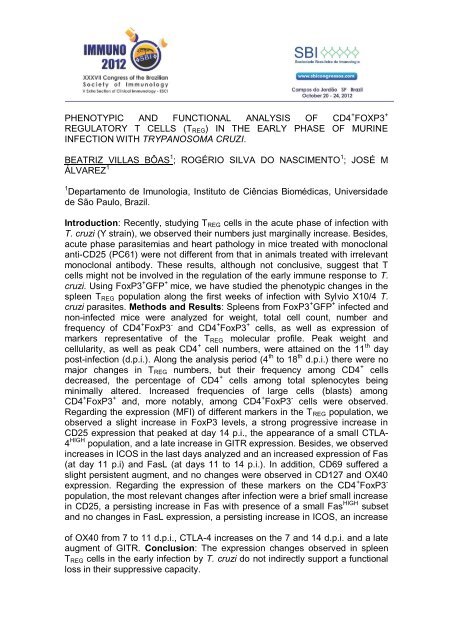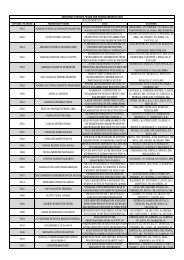immunology of infectious and parasitic diseases - XXXVII Congress ...
immunology of infectious and parasitic diseases - XXXVII Congress ...
immunology of infectious and parasitic diseases - XXXVII Congress ...
Create successful ePaper yourself
Turn your PDF publications into a flip-book with our unique Google optimized e-Paper software.
PHENOTYPIC AND FUNCTIONAL ANALYSIS OF CD4 + FOXP3 +<br />
REGULATORY T CELLS (TREG) IN THE EARLY PHASE OF MURINE<br />
INFECTION WITH TRYPANOSOMA CRUZI.<br />
BEATRIZ VILLAS BÔAS 1 ; ROGÉRIO SILVA DO NASCIMENTO 1 ; JOSÉ M<br />
ÁLVAREZ 1<br />
1 Departamento de Imunologia, Instituto de Ciências Biomédicas, Universidade<br />
de São Paulo, Brazil.<br />
Introduction: Recently, studying TREG cells in the acute phase <strong>of</strong> infection with<br />
T. cruzi (Y strain), we observed their numbers just marginally increase. Besides,<br />
acute phase parasitemias <strong>and</strong> heart pathology in mice treated with monoclonal<br />
anti-CD25 (PC61) were not different from that in animals treated with irrelevant<br />
monoclonal antibody. These results, although not conclusive, suggest that T<br />
cells might not be involved in the regulation <strong>of</strong> the early immune response to T.<br />
cruzi. Using FoxP3 + GFP + mice, we have studied the phenotypic changes in the<br />
spleen TREG population along the first weeks <strong>of</strong> infection with Sylvio X10/4 T.<br />
cruzi parasites. Methods <strong>and</strong> Results: Spleens from FoxP3 + GFP + infected <strong>and</strong><br />
non-infected mice were analyzed for weight, total cell count, number <strong>and</strong><br />
frequency <strong>of</strong> CD4 + FoxP3 - <strong>and</strong> CD4 + FoxP3 + cells, as well as expression <strong>of</strong><br />
markers representative <strong>of</strong> the TREG molecular pr<strong>of</strong>ile. Peak weight <strong>and</strong><br />
cellularity, as well as peak CD4 + cell numbers, were attained on the 11 th day<br />
post-infection (d.p.i.). Along the analysis period (4 th to 18 th d.p.i.) there were no<br />
major changes in TREG numbers, but their frequency among CD4 + cells<br />
decreased, the percentage <strong>of</strong> CD4 + cells among total splenocytes being<br />
minimally altered. Increased frequencies <strong>of</strong> large cells (blasts) among<br />
CD4 + FoxP3 + <strong>and</strong>, more notably, among CD4 + FoxP3 - cells were observed.<br />
Regarding the expression (MFI) <strong>of</strong> different markers in the TREG population, we<br />
observed a slight increase in FoxP3 levels, a strong progressive increase in<br />
CD25 expression that peaked at day 14 p.i., the appearance <strong>of</strong> a small CTLA-<br />
4 HIGH population, <strong>and</strong> a late increase in GITR expression. Besides, we observed<br />
increases in ICOS in the last days analyzed <strong>and</strong> an increased expression <strong>of</strong> Fas<br />
(at day 11 p.i) <strong>and</strong> FasL (at days 11 to 14 p.i.). In addition, CD69 suffered a<br />
slight persistent augment, <strong>and</strong> no changes were observed in CD127 <strong>and</strong> OX40<br />
expression. Regarding the expression <strong>of</strong> these markers on the CD4 + FoxP3 -<br />
population, the most relevant changes after infection were a brief small increase<br />
in CD25, a persisting increase in Fas with presence <strong>of</strong> a small Fas HIGH subset<br />
<strong>and</strong> no changes in FasL expression, a persisting increase in ICOS, an increase<br />
<strong>of</strong> OX40 from 7 to 11 d.p.i., CTLA-4 increases on the 7 <strong>and</strong> 14 d.p.i. <strong>and</strong> a late<br />
augment <strong>of</strong> GITR. Conclusion: The expression changes observed in spleen<br />
TREG cells in the early infection by T. cruzi do not indirectly support a functional<br />
loss in their suppressive capacity.



